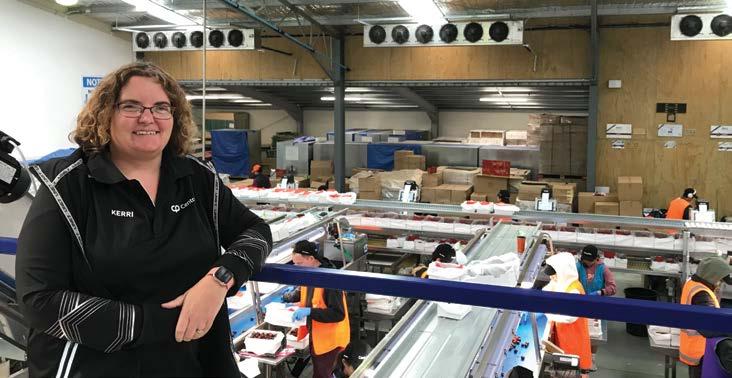
3 minute read
Women in Horticulture – Gender no barrier to success in horticultural career
Kerri Nakajima – operations manager for CentralPac in Cromwell
Gender no barrier to success in horticultural career
When Kerri Nakajima graduated from the University of Canterbury, she expected her BA majoring in Russian language and literature would lead to a role in the New Zealand diplomatic service.
By Elaine Fisher
However, today Kerri is operations manager for CentralPac in Cromwell – the Central Otago facility which packs cherries for more than 20 orchards – and she’s loving it. “It’s such a varied job with lots of challenges and every day is different,” says Kerri who is also a member of Women in Horticulture’s governance group. Kerri, who grew up in Invercargill, doesn’t come from a horticultural background. For five years after leaving university she was an executive assistant and interpreter for Japanese-owned company Bridgestone NZ, which involved some international travel.
In 2005, she and her husband Hiroki moved to Central Otago, and Kerri became office manager and then packhouse manager at Central Cherries in Cromwell. For 10 years she worked for Central Cherries before joining CentralPac as packhouse manager, then production assistant, and now she is operations manager. She and Hiroki live in the Catlins where they have a business, and during the cherry harvest season Kerri bases herself two-and-a-half hours away in Cromwell. “The rest of the time I can do most of my work from home.”
Cherries are the only fruit CentralPac packs and the highvalue, delicate fruit require careful handling from picking to packing. While many primary industries were struggling to find sufficient staff due to New Zealand’s border closures in response to the Covid-19 pandemic, Kerri says CentralPac didn’t have that problem in late 2020. “We have been lucky in that we have attracted some very highly qualified staff from other industries, including from tourism companies in Queenstown, affected by Covid-19, who have joined our team this season. “There are also a number of backpackers who have managed to have their visas extended so they have been able to stay and work in New Zealand.” It’s among those foreign workers that Kerri sometimes gets to practice her language skills, Japanese in particular. “Russian not so much.”
The cherry harvest began in early December with fruit destined first for the national and international Christmas markets, followed by the main harvest in January and February.

“Export fruit goes by air freight to various countries including China, Taiwan, Thailand, Malaysia, Singapore, Canada and North America. Freight costs are more expensive because of Covid.” While she didn’t plan a career in horticulture, Kerri says it’s an industry with so much diversity that it offers a wide variety of opportunities for people from varied backgrounds and with a variety of skill sets. “The biggest attribute required I think is flexibility and willingness to learn on the job. There are always new challenges, and no two seasons are the same.” In her role as operations manager Kerri’s technical knowledge has increased as she keeps pace with the ever-evolving computer technology required in a modern packhouse. In her 15 years in the industry Kerri hasn’t found any barriers to advancement because she is a woman. “It’s not about whether you are male or female, it’s about being confident in your ability and a willingness to work hard and put your ideas forward. You also need to be very flexible to be able to react quickly to the different challenges that each season brings.” Kerri enjoys belonging to Women in Horticulture as it is a way to network and share ideas, learnings and experiences with other women in the industry.
To keep up to date with our news and activities, join our membership database by emailing info@ women-in-hort.nz. We welcome everyone.

Picture a spray system that scans your canopy and accurately applies the right amount of spray and collects data on the fly. Introducing the all new BA Smart Sprayer powered by Smart-Apply®. Find out how you can drive environmental, economic and data gains on your orchard today.
Less is MORE smart :
Up to 73% reduction of spray consumption Up to 87% reduction in spray loss beyond tree canopies Up to 93% reduction in spray loss on the ground
*USDA research has confirmed that LiDAR sensor technology can result in the savings above.
Contact us today for more information or to request a demo at your facility.










